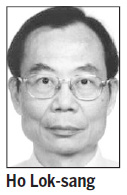Positive attitude is needed to solve bridge impasse
Updated: 2011-06-28 06:54
By Ho Lok-Sang(HK Edition)
|
|||||||

Many people must have been left disappointed by the ruling of the court, following an application for a judicial review by a resident of Tung Chung, that the environmental impact assessment report on the effects of the Hong Kong-Zhuhai-Macao Bridge approved by the Environment Protection Department (EPD) was not up to standard.
That ruling is now seen as holding up the entire project. Taking the brunt of the blow are construction workers, who see this project as a great opportunity to make up for lost income due to recession that killed jobs in the wake of the global financial tsunami. The SAR government is also disappointed obviously, as it would like to have a green light as soon as possible. They are keen on keeping pace with the other part of the project in Zhuhai, which has already started. The proposed bridge is seen by most observers as important to regional integration, especially with the project already approved by the central government and the financing worked out. Moreover, with the work on the mainland side already started in December 2009, it is unthinkable that the project on the Hong Kong side will not go ahead. In fact, it is certainly in the interest of all parties concerned to have environmental clearance as soon as possible.
The SAR government has chosen to appeal the ruling, the right to which it certainly enjoys. It is my wish, however, that while it is waiting for the appeal, it will in the meantime do everything it can to comply with the requirements as laid out by the court. Otherwise there is a good chance that the project may be delayed even more, should the higher court uphold the ruling.
According to the judge that presided over the judicial review case, the environment must not be treated like a "bucket" into which pollutants may be poured so long as it does not overflow. He cited a United Kingdom House of Lords authority in this area of law and the practice guidelines as set out in an EU Directive on environmental protection.
In general, public policy decisions should be based on cost-benefit comparisons. But by just focusing on the environmental aspect, there are two kinds of costs: one is a one-time effect; the other are its on-going effects. The construction of the bridge will produce a one-time disturbance to the environment. Unless that disturbance causes the extinction of a valued species, or serious harm to the health of some people, usually the one-time disturbance can be tolerated, provided that the benefits are significant.
However, the on-going effects will consume a percentage of the limited capacity of the environment to absorb pollutants or to rejuvenate itself. Without knowing the percentage that is being consumed, it is not clear what the environmental costs are. We cannot say that as long as the project has not exhausted the capacity, the environmental impact is acceptable.
To take such a position is tantamount to saying the assignment of environmental resources to different uses should be based on the "first come, first served" principle. This would not make much sense, because we really should compare the benefits with the cost, which must consider the exclusion of other projects that may bring even bigger benefits. If we consume a bigger percentage of the capacity of the environment to rejuvenate itself, we would be paying a bigger cost. Just assessing whether a project would exhaust that capacity is clearly not enough.
The ruling will certainly have implications for other projects as well, because the EPD had all along approved reports that merely provided evidence that the proposed projects would not violate the tolerance limits set out by the Department. But this is all to the good. Hong Kong has a population well over 7 million now, and Hong Kong people are now much more health-conscious. Moreover, Hong Kong is now contesting with the top global financial centers in attracting top talents to serve in its booming financial industry. It is appropriate to give more weight to environmental concerns.
It is time the SAR government lend an ear to dissenting voices, not all of which are meant for ill. While many of the pan-oppositionists are certainly looking for any grounds to attack the government, partly for political gains, there may still be validity in some of their complaints. A more enlightened government will be better able to take advantage of the wisdom voiced out by other politicians. Similarly, a more enlightened opposition should actively look for opportunities to interact and to socialize with both the government and senior officials from Beijing.
It is a pity that some pan-oppositionists declined to meet Wang Guangya, director of the Hong Kong and Macao Affairs Office, when he visited Hong Kong recently. To demand that he must find time to interact with Legco members given his tight schedule is unreasonable. To have declined the invitation to the luncheon is impolite and truly unwise. Before they can serve Hong Kong better, both government officials and legislators need to be more open and put aside their knee-jerk assumptions that the other guy is an enemy to be dealt with. After all, they -and we - are all serving Hong Kong in different capacities.
The author is director of the Centre for Public Policy Studies, Lingnan University.
(HK Edition 06/28/2011 page3)